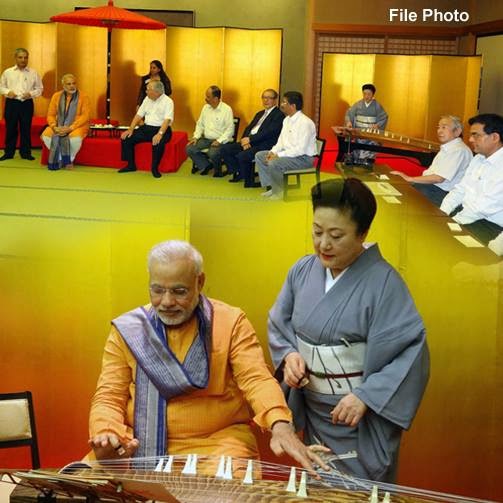"Booted rahena better hae, booted out hona khatarnaak hae (to put on a good footwear is better, but it's dangerous to be out of power)".
These were the best words of advice from the Finance Minister Arun Jaitley, an acclaimed lawyer in his own right, to Congress vice president Rahul Gandhi.
FM took up the battle on behalf of the Modi government in the Lok Sabha and batted strongly for the Land Bill even as he termed NDA regime as a sensible dispensation and added, "Our's is a Soojh-boojh ka sarkar"
That he is a debater par excellence left all and sundry impressed and even pro-Congress army of journalists in the press gallery along with the likes of Mallikarjun Kharge and K V Thomas, family loyalists, were left leaking their wounds.
Amid heated debate over the agrarian crisis hitting the country, the Finance Minister Arun Jaitley today said the Congress leader Rahul Gandhi "should not be allowed" to play politics with farmers issue even as he made a strong pitch for the Land Bill brought by the Modi government, which is being described as anti-farmers by an united opposition.
Appreciating the gravity of the situation as doubts linger on the possibility of the passage of the Bill,
which has been brought now as Ordinance twice, Mr Jaitley took repeated jibe at Congress vice president for discovering the farmers issue after his 57-day-long sabbatical.
"I think it has become customary now that we should all be concerned with regard to the farmers. But nobody should be allowed to use the farmer as a political instrument," Jaitley said in Lok Sabha even as Congress vice president has made repeated charges against the government for being pro-corporate and anti-farmers.
The Finance Minister insisted that the "politics of obstructionism" let loose by opposition was harming India's economy.
In my earlier blog I had spoken about Rahul Gandhi's 'anti-development agenda' and the manner by which Congress is now opposing even the GST Bill show its real intent.
A fresh ordinance on it was promulgated by President Pranab Mukherjee on April 3 after the first executive order promulgated in December last year was about to lapse as the government failed to push the Bill in Rajya Sabha during the first part of Budget session. The Finance Minister took potshots at the Gandhi scion and said in tongue-in-cheek fashion, "booted rahena better hae, booted out hona khatarnaak hae (to put on a good footwear is better, but it's dangerous to be out of power)".
Replying to members during a debate on the Finance Bill in Lok Sabha, Mr Jaitley joined issue with the Congress leader for his remarks "suit-boot ka sarkar" remark against Modi government.
Instead the ruling Modi regime is a "soojh-boojh ka sarkar (a government of reasoning and
common sense)", he waxed eloquently.
Referring to repeated attack by Rahul Gandhi and other Congress leaders like Mallikarjun Kharge and
K V Thomas on Prime Minister Narendra Modi's "frequent foreign visit", Jaitley countered saying,
"India is now being considered a global leader and that is no mean achievement.
It was unheard of, that when a Prime Minister travels abroad, the entire diaspora is rejuvenated".
 |
| PM during Japan visit |
Prime Minister Modi may travel abroad, "but at least we know where he is," he said referring to the mystery
surrounding the Congress vice president's unspecified location during his sabbatical.
"There is a difference between performing a national duty (by PM) and disappearing for jaunt (by Rahul),"
the FM insisted. "You have criticised Prime Minister for being abroad, but at least we knew where he was".
Referring to PM's 16 trips abroad as also mentioned by Congress member K V Thomas during the debate, FM Jaitley shot back:
"Is India taller in the comity of nations today than it was a few years ago or -- not?
I was surprised when I read that in the last few days that compared to the
developed world whether it was Iraq or it was Yemen or it is Nepal today, it is
India which is now being considered as a global leader even in areas where we
could not manage our own affairs earlier – disaster management. It is a no mean
achievement".
Jaitley's remarks were, however, countered by Congress floor group Mallikarjun Kharge, who said he did not expect Jaitley to reduce the discussions on the Finance Bill to these matters.
Kharge also said Jaitley was trying to represent a "bad case" vis-a-vis the government's
stand on the agrarian crisis as a good lawyer often does in a court of law.
"It will be improper to give an impression that Congress is anti-farmers and anti-industry," Kharge argued. Admitting that the ongoing agrarian crisis is a challenge, Jaitley informed the House that the government is committed to helping the farmers.
"Weather has not been good to us..... The agrarian crisis is a challenge, but we have many reforms which are currently in the pipeline. The government is helping the farmers," he said and referred to Prime Minister's intervention to give compensation to more numbers of farmers.
"In order to bring relief to the farmers, it is not the last step," FM said referring to relaxation in criterion of 33 per cent crop damage for compensation as against 50 per cent damage earlier.




















